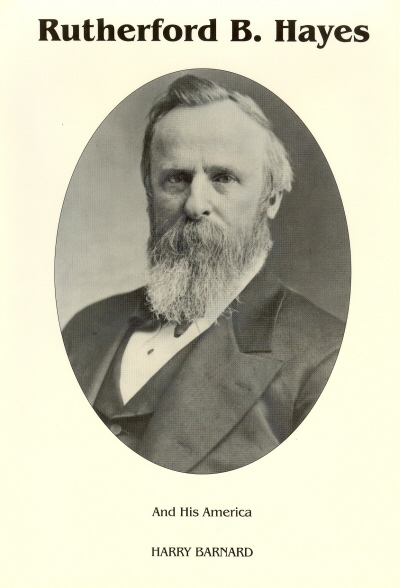RUTHERFORD B. HAYES AND HIS AMERICA
by Harry Barnard
ISBN 978-0-945707-05-9 $32.50
606 pages including bibliography, notes, acknowledgments and index.
15 pages of illustrations.
Originally published by Bobbs-Merrill in 1954, Harry Barnard's
definitive biography of Rutherford B. Hayes has been out of print
since then. The American Political Biography Press edition brings that
important work back to print.
All that Hayes had done before, and all that he was to do after
the disputed election of 1876 - - he had been a fighting brigadier general
in the Civil War; he had been an Ohio congressman; he had been Ohio's governor
three times; and he was to become the nation's nineteenth president - - has
been largely lost to history. Hayes, if known at all, is known for the
disputed election with Samuel J. Tilden.
Neither Hayes nor Tilden was a clear winner in the election
of 1876. Both men were pushed to the side-lines as the political armies
whose interests were represented by one man or the other, clashed in a fight
to the end. At times Civil War seemed possible. Although the struggle
took on all the habiliments of an involved but civilized legal question, it
was clear to all that his was a contest of naked power; a contest that ended
with Hayes' elevation to the presidency.
Having been the standard bearer of his party during the struggle
for the White House, Hayes stood larger than life at the beginning of his
term. And, yet, as his administration unfolded, it quickly became, and
remained, an anti climax to the contest for the right to form that administration.
Even during the one big event of his time in the White House - - the Compromise
of 1877 that ended reconstruction - - Hayes seems to have stood passively
to the side as events swirled largely around him; seeming to happen without
his influence or interference rather than as a result of his efforts and energy.
Hayes' private life as that of the successful Gilded Age business
man and lawyer. His integrity was, unlike so many men of the age, unfailingly
scrupulous. He was raised in a home dominated by women and formed what
appears to have been an unusual attachment to his sister, an attachment that
for a long time, threatened the fulfillment and happiness of his marriage.
Rutherford B. Hayes was indeed a man of his times, not a man of history.
In Barnard's words, his book was an attempt to "...try to bring
RBH back - to restore him, so to speak, not on a pedestal in some marmoreal
pose, bout as he was, a man. This is intended, not so much as a biography
of a president but rather the biography of a man who happened to become President."



